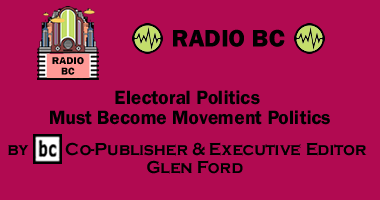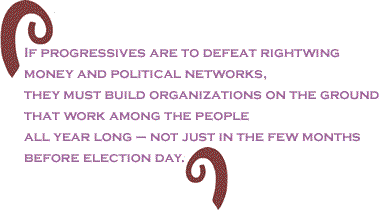
|
|||||||||||||||||||||
 |
|||||||||||||||||||||
 |
|||||||||||||||||||||
 |
|
|
Cynthia McKinney will be leaving the United States Congress in early January of next year, having lost a Democratic primary runoff election to an obscure former county commissioner named Hank Johnson. Also arrayed against McKinney were the entire Atlanta, Georgia and national media. McKinney is anathema to those who insist that racism is a thing of the past, that militarism is a virtue, that poverty is the fault of those who are poor, and that nearly a million Black people are incarcerated because African Americans are simply prone to criminal behavior. Those same forces took McKinney’s seat away in 2002, but she made a comeback in 2004. Now she must consider how or if she wants to reclaim the suburban Atlanta seat in 2008. Georgia is a Diebold voting machine state. These devises “flip” more votes than McDonald’s flips hamburgers – and the flipping is always in one direction: to the candidate on the Right, usually Republicans, but also to Democrats like McKinney’s opponent Hank Johnson, who marketed himself as a politician who would not cause controversy. “Phantom voters” somehow are allowed the privilege of casting ballots from precincts in which they don’t live, or that are not even in the congressional district. Candidate’s names fail to appear on the screen, or pop up in other districts, where they are not running. Strange things happen in the world of Diebold voting machines. In addition, Republicans have mastered the evil arts of redistricting to manipulate and confuse the electorate. McKinney’s district has been redistricted so often, many voters no longer have any idea which district they live in.
If progressives are to defeat rightwing money and
political networks, they must build organizations on the ground
that work among the people all year long – not just in the few months
before election day. In short, progressive electoral politics must
function like movement politics. Otherwise, the energized rightwing
minority will triumph, again and again. For Radio BC, I’m Glen Ford. BC Paid Subscribers can visit the Radio BC Master page to listen to any of our audio commentaries voiced by BC Co-Publisher and Executive Editor, Glen Ford. We publish the text of the radio commentary each week along with the audio program. |
|
| Home | |
Your comments are always welcome. Visit the Contact Us page to send e-Mail or Feedback or Click here to send e-Mail to [email protected] e-Mail re-print notice
If you send us an e-Mail message we may publish all or part of it, unless you tell us it is not for publication. You may also request that we withhold your name. Thank you very much for your readership. |
|
| August 31, 2006 Issue 195 |
||||||||||||||
|
||||||||||||||
|
||||||||||||||
| Printer Friendly Version in resizeable plain text format | ||||||||||||||
 |
||||||||||||||
 |
||||||||||||||
 |
||||||||||||||
 |
||||||||||||||
| |
||||||||||||||
| |
||||||||||||||



























